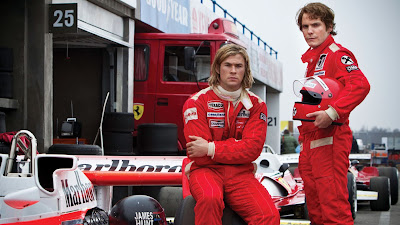You’ve got to hand it to Peter Morgan, the man
knows how to write a good screenplay about rivalry – especially when it’s
between two ambitious male figures. The
Damned United centred on Brian Clough’s ill-fated obsession with eclipsing
Don Revie’s achievements as Leeds United’s top manager. Frost/Nixon instead told the story of two men down on their luck,
desperately trying to reinvent themselves and outsmart each other in a series
of fraught TV interviews. And in Rush,
the attention is on historical Formula 1 rivals James Hunt and Niki Lauda, two
egocentric and fiercely competitive drivers with polar opposite characters.

Unlike Asif Kapadia’s excellent documentary Senna, there was always a risk Rush might turn out like a by the
numbers biopic, one that follows the tried and tested from-rags-to-riches-to-rags-and-back-to-riches-again
narrative arc. Luckily, Morgan’s script steers clear from such conventions
partially thanks to its authenticity (the real Niki Lauda has already commended
the film for its adherence to true facts), but mainly due to the fact that it’s
fundamentally a two-hander. What makes the film even more compelling to watch
is that, like the characters they play, both Daniel Brühl and Chris Hemsworth
have a lot to prove to their audiences.
Hemsworth, who in the space of two years has
starred in three blockbuster hits and has already garnered a vast female
fanbase, is clearly keen to flex his acting muscles and show the world he’s
more than just the God of Thunder or a poster on a girl’s bedroom wall. A cynical-minded
viewer (or the afore-mentioned girl’s boyfriend) could argue that, as the
impeccably chiselled, womanising Hunt, Chris has got little to do other than
show up and let his good looks do the acting, but that would be an unfair call.
He is gradually acquiring more range with each film he does and while he never
truly gets under the Shunt’s skin, Hemsworth does manage to convey the
requisite amount of charm and playboy bravado to do justice to the one time
maverick. Some might say this is an overall superficial portrayal, but it’s
hard to imagine the real James Hunt would complain about being depicted as a
magnetic trouble-maker.
On the other hand Daniel Brühl, who has made a
name for himself starring in European productions, probably thinks he could do
with some much deserved recognition in the American film industry. That said,
there’s nothing opportunistic about his approach to the role, as Brühl manages
to inhabit Niki Lauda to the point of achieving something of a chameleonic resemblance
to the real life Formula 1 veteran. Blunt, anti-social and analytical to the
point of resembling a cold-hearted asshole, Lauda could be very easily
dismissed as the villain of the picture, the hurdle Hunt needs to overcome by
the end of the movie. But in Brühl’s hands, he comes off as an introverted, misunderstood
figure who invests all his attention into racing quite possibly as a way to conceal
his insecurities as a man. The scene in which he stands up to Hunt by trying to
put an eloquent spin on his bestowed moniker, The Rat (“They have great
survival instinct!”), is quite possibly the most deceptively heart-breaking you’ll
see all year.
Adding further pathos to this compelling
rivalry is Ron Howard’s direction of the F1 races, which are easily the most
thrilling ever committed to film, as tyres screech, engines rev and water
splashes in slow motion in the rain-drenched sequences. And for those who are wondering,
the Nürburgring incident is recreated in all pain-inducing detail, with the
make-up artists doing an impressive job at recreating Lauda’s third degree
facial burns.
But perhaps what makes Howard’s film stand out
is its central message, i.e. that a wise man can learn more from an enemy than a fool would from his friends. A tad cheesy, maybe? Perhaps, but when
delivered as a bookend to a film this good and supported by two absorbing performances,
it certainly doesn’t feel forced. A great Formula 1 film that fires on all
cylinders.
4/5




